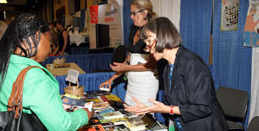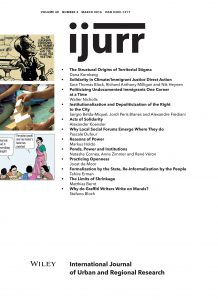The Conference Conundrum: Yes, You Should Sumbit
Recently, I was asked to prepare a presentation for first year graduate students on presenting at professional conferences. I immediately recalled how terrified I was at my first round table presentation during the 2009 Eastern Sociological Society Annual Meeting and thought useful a simple summary of the various annual meetings and conferences might be for students in the early years of graduate school.
Presenting papers at professional conferences has been a useful tool during my graduate school career. In addition to the obvious benefits of networking and receiving feedback on my work, conference presentations have helped me determine what kind of research was of interest to me, clarify my research questions and methodologies, think about why my research is a meaningful contribution to the field of sociology, and tease through various drafts of my doctoral proposal. However, in the early days of graduate school I did not realize how important conference presentations were to the development of my work. I only knew that graduate students were supposed to present at conferences. I also (falsely) believed that national conferences like the Annual Meeting of the American Sociological Association were somehow better or more useful than smaller regional conference or mini conferences.
That being said, the annual ASA meeting is still an important part of my professionalization process. First, the meeting is the one time of the year where I am able to speak in person to sociologists outside of the general New York area. It is the place where I have been able to meet and even briefly speak with those “celebrity scholars” whose work has impacted my work and my thinking about the social world in general. It is also the place where I have been able to meet up with former professors, colleagues, and friends and learn about how their work has progressed and transformed over the years. That being said, the annual ASA meeting is the only professional conference where my work has been so harshly criticized that I felt attacked. In speaking to other students and seasoned scholars I have found that I am not alone in this experience.
In my experience, regional meetings and local conferences tend to have more gentle audiences who provide support and advice for developing work. I think that is why calls for smaller conferences often only ask for an abstract rather than a complete paper at the time of submission. Throughout the years, I have found presenting developing work at local and regional conference to be a tremendous asset. Numerous times these smaller venues have allowed me to “fail” without feeling like an academic failure. I have presented several of my “brilliant original ideas” that were intrinsically flawed or written on hundreds of times. I have used smaller conferences to become more comfortable speaking about my work to a room of peers. And I have presented early, less developed versions of papers at smaller conferences as a mechanism to prepare for the more critical crowd at ASA.
Despite the ways conference presentation has helped me develop me work over the years, more recently I find myself attending fewer conferences than I did in the past. For me, one of the most difficult challenges of presenting at conferences is the cost associated with traveling. I have spent a number of years searching for money to help cover the costs of travel, hotel accommodations, food, and other conference related expenses. Many universities provide graduate students with funds for conference presentation. Graduate student organization and graduate unions also might provide resources to cover professional expenses, including conference presentation. Various honor societies and external organizations also might award travel grants. Meetings also have limited amounts of funding graduate students. For example, the ASA grants approximately twenty-five $225 student travel awards each year. Time is a more difficult problem to solve. Therefore, today I commit to two conferences a year and I do not always stay the entire length of the conference.
I want to stress how presenting at professional conferences to be one of the most important tools in my sociological toolbox. There is just something about taking your work outside of your own university walls that make you feel more professional, more authentic, more of a “real” sociologist. I have also been able to travel to Dallas, Chicago, Baltimore, Boston, Denver, and Atlanta for various conferences, receiving just as much useful feedback from roundtable talks as during panel presentations. I am looking forward to the upcoming ESS meeting in New York and the ASA in Chicago. And maybe even get together with other news editors and readers of Sociology Lens in 2015.







1540-6237/asset/SSSA_Logo-RGB.jpg?v=1&s=c337bd297fd542da89c4e342754f2e91c5d6302e)
